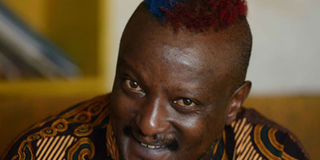Premium
Binyavanga was controversial, but Kenya owes him tribute

Kenyan writer Binyavanga Wainaina. "Nothing has surprised me more than coming to love this person," he once said. PHOTO | FILE | AFP
What you need to know:
- In January 2014, on his birthday, Binyavanga came out publicly as being gay in what he described as “the lost chapter” of his memoir.
- From that point onwards, Binyavanga’s life’s work, and all that it’s worth was reduced to ashes since he was now perceived as nothing more than a gay man.
Yet to those who saw his coming out as a necessary act of courage, Binyavanga became a revered giant.
These two extremes, of love and hate, emerged the moment news of Binyavanga’s passing was made public.
Asked by a BBC interviewer how he would like to be remembered, Nigerian Nobel Laureate for Literature Wole Soyinka responded that it was not his problem. To Soyinka’s mind, that was something for those he would leave behind after his death.
‘‘Anything I do has nothing to do with being remembered,’’ Soyinka said. ‘‘I don’t think along those lines.’’
NONCHALANCE
The interviewer wouldn’t relent, and Soyinka’s response was that the question did not matter.
‘‘Do you want me to tell you how I will remember you?’’ the interviewer persisted.
‘‘No! No! No!’’ Soyinka protested. ‘‘I’m not interested.’’
‘‘I will remember you as an eloquent, restless, wonderful man whose ideologies transcended the human condition in so many shapes and forms,’’ the interviewer insisted, ‘‘but who was greatly misunderstood.’’
‘‘I’ll settle for that,’’ a smiling Soyinka conceded.
To Soyinka, living life was not about obsessing on how one will be deemed to have lived, but more about one living their best possible life, and doing so the best way they know how.
Of course there was a tinge of modesty in Soyinka’s nonchalance about the question of remembrance.
The man knows that he will certainly be remembered as someone who strode the African and global world of letters, going as far as being referred to as the conscience of the nation for standing up to various Nigerian military dictatorships, including that of Sani Abacha, which forced him into exile.
SUBVERSIVE
On May 21, Kenyan prolific writer and thinker, Kenneth Binyavanga Wainaina, breathed his last.
Binyavanga had spent close to two months at the Aga Khan University Hospital’s Intensive Care Unit (ICU). Having suffered an initial stroke in 2011, Binyavanga got a second hit in late 2015, from which he didn’t fully recover. It has been a more or less downward spiral from that point onwards, until his recent death.
Hailed as one of Time magazine’s 100 Most Influential People in the World in 2014, Binyavanga became one of the most recognisable African writers when his satirical essay, How To write About Africa, became the most read piece ever published by the UK’s Granta magazine.
In the continent, Binyavanga gained literary prominence in 2002 when he won the newly introduced Caine Prize for African Writing for his story Discovering Home, in which he chronicled his journey to Kisoro, his mother’s village at the Uganda–Rwanda border, from where he got his maternal grandfather’s name, Binyavanga.
His journey to Kisoro had begun in South Africa, where as intimated in his acclaimed memoir, One Day I Will Write About This Place, he had fallen out of status and was keeping himself afloat by working as a journalist for the Mail & Guardian, among other publications.
Yet Binyavanga’s enduring notoriety was that he spent a proper chunk of the $10,000 (Sh1.3 million at current exchange rates) Caine Prize award money to fuel the founding of Kwani?, the subversive literary journal which sought to redefine the idea of literature in Kenya and beyond, including by publishing stories and poems written in Sheng.
As the journal’s founding editor and unofficial spokesman, Binyavanga made himself enough enemies, with the claim that Kwani? wanted to rid the literary scene of gatekeepers, most of whom dwelt in the Literature departments of local universities.
HOMOSEXUALITY
There would be endless debates in the pages of weekend newspapers as to whether the Kwani? philosophy of breaking the gates and letting in every Tom, Dick and Harry into the literary holy of hollies was an abomination, and whether whatever the journal was publishing could even pass for literature.
But if anyone thought that was the end of Binyavanga’s controversies, then they were dead wrong.
In January 2014, on his birthday, the world woke up to I am a Homosexual, Mum, a short essay Binyavanga described as “the lost chapter” of his memoir, in which piece of writing he came out publicly as being gay.
From that point onwards, Binyavanga’s life’s work, and all that it’s worth – especially to those in Kenya and elsewhere who are either opposed to homosexuality, the idea of speaking about it in public or both – was reduced to ashes since he was now perceived as nothing more than a gay man.
Yet to those who saw his coming out as a necessary act of courage, Binyavanga became a revered giant.
These two extremes, of love and hate, emerged the moment news of Binyavanga’s passing was made public.
One, therefore, wonders, will he be remembered as a Kenyan cultural worker of note, or did all that quickly go down the drain the moment he brought his sexuality into the picture?
Like Soyinka, Binyavanga was probably not bothered about remembrance, since that is a question for others.





